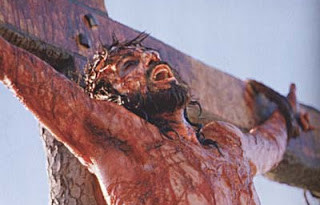One last post on the PSA debate, since I promised I’d write this a while ago. As I discussed before, there’s a lot of controversy at the moment in Christian circles about Penal Substitutionary Atonement – essentially, the idea that Jesus died on the cross to take the punishment for our sins to bring us to God. But what does that mean?
One particularly important question about how we understand and explain the Cross is whether it is true to say “God punished Jesus” (see Google for some examples of people saying this). My opinion is that while Penal Substitution is a true, though partial, description of the Atonement, saying that “God punished Jesus” is to oversimplify and distort what the Bible says about the Cross.
If you’d like to read a case in full for Penal Substitutionary Atonement, then you might want to check out Pierced for Our Transgressions, which attempts to give the Biblical case for it. I’ll just quickly run through some objections to the idea:
Objection 1: Unloving?
Is it unloving of God to punish sin? There’s lots that could be said about this, but I think one of the most important points is that God’s justice is an expression of his love, not something opposed to it.
Firstly, God’s justice is an expression of his love for himself that exists between the persons of the trinity. He owes it to himself, out a love for the justice and goodness that finds its definition in his character.
Secondly, God’s justice is an expression of his love for those wronged. When we hear about a child snatched, an innocent murdered, there is a part of us that longs for justice. Although that desire can become twisted and lead to wrong anger, righteous anger is a product of love.
Thirdly, God’s justice is an expression of his love for the sinner. When God punishes, it isn’t because he has given up on loving someone. His fair treatment of us is a loving action, though it is a saddened love, forced to take the hard decision.
Objection 2: Unfair?
Even if it’s loving, is it fair and just that Jesus, an innocent third-party, sacrifices himself to take our punishment? But Jesus is not someone unconnected for us. We have union with Christ if we have faith in him. Penal substitutionary atonement needs to be understood within the framework and context of Christian theology as a whole. One of the reasons Jesus can die in our place and we can gain the benefits of this is our union with him.
Objection 3: Unwilling?
Is Jesus an unwilling victim? On the contrary, the Father and Son planned together that the Son would sacrifice himself. Jesus is not only connected with us as sinners, but connected with God as Lawgiver and Judge. The unity of the trinity means that he is a willing agent in the process of atonement, and can be the mediator between us and God.
Did God punish Jesus?
As far as I can see, the Bible never speaks of God punishing Jesus. Isaiah 53, speaking prophetically about Jesus’ suffering says that “the punishment that brought us peace was upon him”, but I don’t think that’s saying quite the same thing.
Instead, it speaks in many places of Jesus being sacrificed. Sacrifice is the destruction or giving up of something in place of something else. Sometimes the person described as doing the sacrificing is Jesus sacrificing himself (e.g. Ephesians 5:2, Hebrews 7:26), in other places the Father sacrifices the Son (e.g. Romans 3:25, 1 John 4:10). Jesus sacrificed himself for us; his death was a sacrifice in the place of our punishment. Sin is dealt with by the shedding of blood, as Hebrews says is necessary for the forgiveness of sins, but as a sacrifice instead of punishment.
However, there is a clear penal element to the Cross. Jesus suffered spiritual and physical death (spiritual death being the separation from God he experienced on the Cross, “my God, my God, why have you forsaken me?”), which is the same as the punishment we are due for sin. And Isaiah 53 also indicates a strong penal element.
But two people can perform an action that is identical in content, but different in meaning. For example, I could say “I’ll be back” as a threat or as a promise, depending on the context and situation. A parent might legitimately smack their child if they do something wrong, but if I were to go and smack their child, then even though it’s an identical action, it would have a different meaning – I’d be assaulting that child [Additional note 2023: at the time this was first written smacking hadn’t been banned in Scotland and Wales.]
Similarly, what happened on the Cross was the same in content as the punishment our sin deserves: Jesus underwent separation from God and death, just as we deserve. He did indeed bear God’s wrath, his anger and judgement against sin. But Jesus had not done wrong, he had no sin that needed punishing. The meaning of the Cross was not punishment, but sacrifice. That’s the language the Bible uses to explain the meaning of the Cross, so I think we should do the same, too.
The language of sacrifice also reinforces one of the points made above, the unity of the Father and the Son’s actions. “God punishing Jesus” suggests a false dichotomy of an angry God being placated by a loving Son, or Jesus being the unwilling recipient of cruel abuse. “Self-sacrifice” makes much more sense than “self-punishment”. [Also, there’s a long tradition in Christian theology of talking about the Cross in terms of ‘satisfaction’ – punishment and sacrifice being two parallel but distinct ways of satisfying God’s justice – see Recovering the Classical Concept of Satisfaction by Carl Mosser].
John Stott makes much the same point in The Cross of Christ:
“We must not then speak of God punishing Jesus, or of Jesus persuading God, for to do so is to set them over against one another as if they acted independently of one another or were even in conflict with one another. We must never make Christ the object of God’s punishment, or God the object of Christ’s persuasion.”
Conclusion
This is where I’ve arrived at so far in trying to grapple with the Bible on this subject. I’m not denying the penal dimension of the atonement, only to trying to explain it in a properly and Biblically nuanced way, to do justice to Scripture rather than reduce it to a caricature, especially when there’s a danger of creating a caricature that makes God appear an unloving tyrant rather than loving redeemer. If you think I’ve misunderstood what the Bible teaches about the atonement, please add a comment explaining what you believe it says!
Addendum 1, July 2019: This particular post has continued to get website traffic and generate questions. I’ve always seen penal substitutionary atonement as central to a proper understanding of the Cross, and this was an attempt as a student to grapple with how to communicate that vital truth in a way that’s Biblically faithful and culturally sensitive.
Looking back several years later, I think I overstated parts of the case in the post that follows, as Daniel Hill suggested in the comments. Especially when I said “the Bible never speaks of God punishing Jesus” I was too hasty in putting aside Isaiah 53 in particular. I was relying too closely on a fairly shallow prooftexting – looking for specific phrases in the Biblical text rather than parsing out the concepts implied.
The way I would approach this today is to argue that sacrifice the more dominant theme in how the Bible explains Jesus’ death, but there is a secondary place for explaining it from the Bible in terms of “Jesus being punished in our place” if that’s unpacked carefully.
Addendum 2, November 2021: I recently read a helpful article Recovering the Classical Concept of Satisfaction by Carl Mosser. It traces similar distinctions to the ones I make below between punishment and sacrifice in terms of punishment and satisfaction, in various theologians historically including Aquinas, Calvin and the Puritans. It’s reassuring for me to discover that my intuitions have some grounding in historical theology – it makes me more inclined to think I was on to something rather than being overly pedantic about terms. So I’d again come back to my original position of wanting to explain the Cross in terms of sacrifice rather than punishment.









